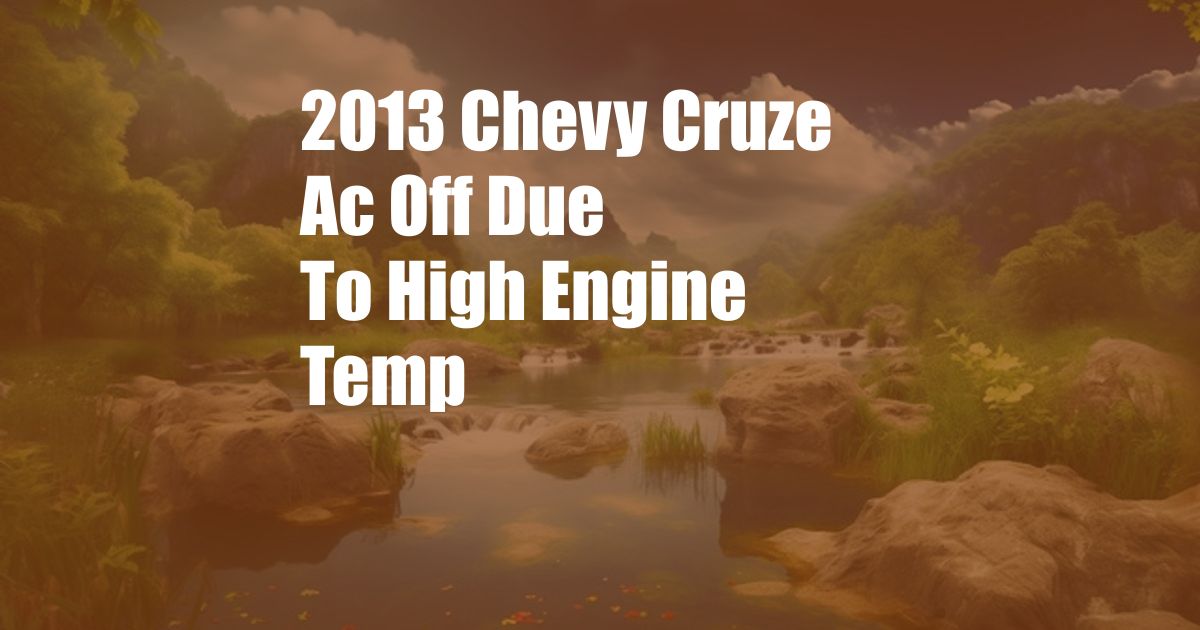
2013 Chevy Cruze AC Off Due to High Engine Temp: Causes and Solutions
Driving a car in the scorching summer heat can be unbearable without proper air conditioning. It’s especially frustrating when the AC suddenly shuts off due to a high engine temperature, leaving you drenched in sweat and discomfort.
If you’re facing this issue in your 2013 Chevy Cruze, know that you’re not alone. In this comprehensive guide, we will delve into the underlying causes of this problem and provide effective solutions to get your AC back up and running.
Causes of AC Shutting Off Due to High Engine Temperature
The primary purpose of a car’s air conditioning system is to keep the cabin cool and comfortable, even when the outside temperature is sweltering. However, when the engine temperature rises excessively, the AC system may automatically shut off as a protective measure.
The reason behind this is that the engine and the AC compressor share the same cooling system. When the engine temperature exceeds a certain threshold, the cooling system prioritizes cooling the engine to prevent any catastrophic damage. As a result, the AC compressor is temporarily deactivated to reduce the load on the cooling system.
Diagnosing the Root Cause
To effectively resolve this issue, it’s crucial to identify the underlying cause of the high engine temperature. Here are some common culprits:
- Coolant Leaks: Coolant is a vital fluid that absorbs and dissipates heat from the engine. If there’s a leak in the cooling system, the coolant levels will drop, reducing the system’s ability to cool the engine effectively.
- Faulty Thermostat: The thermostat regulates the flow of coolant through the cooling system. If the thermostat malfunctions and fails to open, the coolant won’t circulate properly, leading to engine overheating.
- Clogged Radiator: The radiator is responsible for dissipating heat from the coolant. Over time, the radiator can become clogged with dirt and debris, obstructing the flow of air and reducing its cooling efficiency.
- Faulty Water Pump: The water pump circulates the coolant throughout the cooling system. If the water pump fails, the coolant won’t circulate properly, resulting in high engine temperatures.
Solutions for Fixing AC Shutting Off Due to High Engine Temperature
Once you’ve identified the root cause of the high engine temperature, you can proceed with the appropriate solution to fix the problem:
- Check Coolant Levels: Check the coolant reservoir regularly to ensure there are no leaks and that the coolant levels are between the “min” and “max” marks. If the coolant level is low, top it up with the recommended coolant specified in your vehicle’s owner’s manual.
- Replace Thermostat: If the thermostat is faulty, it needs to be replaced. This is a relatively simple and inexpensive repair that can be done by most DIYers.
- Clean Radiator: To clean the radiator, you can use a garden hose or a radiator flush kit. If the radiator is heavily clogged, it may need to be replaced.
- Replace Water Pump: Replacing a water pump is a more involved repair than the previous ones. It’s recommended to have this done by a qualified mechanic.
Tips and Expert Advice
In addition to addressing the underlying cause of the problem, here are a few tips and pieces of expert advice to help prevent AC shutdown due to high engine temperature in the future
Avoid Idling: Extended idling can put excessive strain on the engine and cooling system. Minimize idling time, especially in hot weather.
Use AC Economically: When using the AC, avoid setting the temperature too low. This puts extra stress on the cooling system. Aim for a comfortable temperature setting that doesn’t overwork the system.
Periodic Inspections: Regularly inspect your cooling system for any leaks, cracks, or loose connections. Pay attention to the coolant levels and the condition of the radiator. Early detection and maintenance can prevent minor issues from escalating into major problems.
FAQ
Can I drive with the AC off when the engine temperature is high?
Yes, but it is not advisable. Driving with the AC off may provide temporary relief from the heat, but it does not address the underlying issue of the high engine temperature. It’s important to address the root cause to prevent further damage to your vehicle.
What other signs indicate a potential cooling system issue?
Apart from the AC shutting off, other signs that may point to a cooling system issue include:
- Increased coolant consumption
- Steam or coolant leaking from the engine
- Overheating engine
- Reduced engine power
Conclusion
If your 2013 Chevy Cruze’s AC is shutting off due to high engine temperature, don’t panic. Equipped with the knowledge and solutions outlined in this article, you can effectively diagnose and resolve the issue, ensuring a comfortable and cool driving experience even on the hottest days.
Remember, regular maintenance and attention to the cooling system are key to preventing this issue from recurring. If you have any further questions or concerns, don’t hesitate to seek professional assistance from a qualified mechanic.
Are you experiencing AC shutdown due to high engine temperature? Share your thoughts and experiences in the comments below.